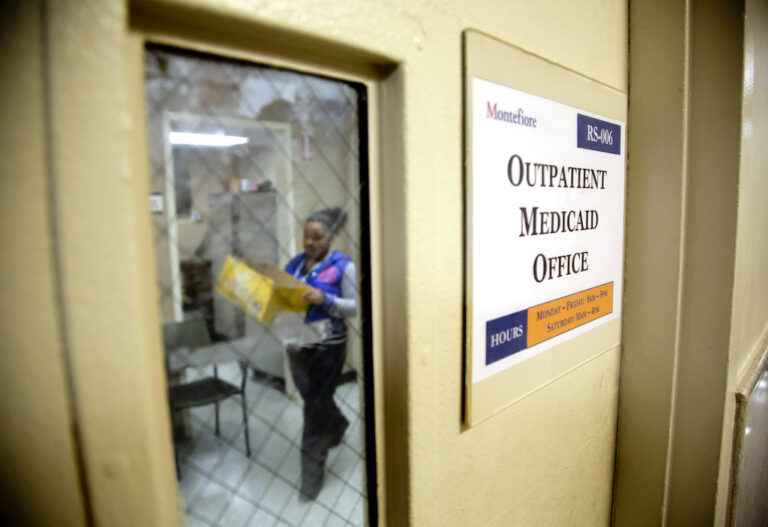A new analysis finds that in the 10 states that haven’t expanded Medicaid under the Affordable Care Act, nearly 1 in 5 uninsured working-age adults are caught in a health care limbo known as the “coverage gap”: They earn too much to get Medicaid but not enough to qualify for financial assistance to buy a plan on their own in the marketplace.
In Alabama and Mississippi, more than a quarter of uninsured working-age adults lack the means to get affordable health insurance, according to an analysis by the Center on Budget and Policy Priorities, a progressive think tank that studies federal and state budget policy. Overall, that situation affects 1.6 million adults between the ages of 19 and 64 in non-expansion states.
This is a matter of life and death, not just for individuals but for entire communities.
– Mississippi Democratic Congressman Robert Johnson
“These are all people who earn below the federal poverty level and don’t have access to financial assistance or insurance,” said Gideon Lukens, a senior fellow and director of research and data analysis on the organization’s health policy team.
The analysis also found that more than 60% of those in this gap are people of color: 35% are Latino, 24% are Black, and 2% are Asian.
Rep. Robert Johnson, a Democrat from Mississippi, said the lack of insurance is causing other problems everywhere, including the closure of hospitals that have to cover the costs of treating uninsured patients.
“This is not about conservatives or liberals. This is about the people that we represent in Mississippi, whether they’re black or white,” Johnson said in an interview. “This is a matter of life and death, not just for individuals, but for entire communities.”
What is the coverage gap?
The Affordable Care Act, also known as Obamacare, was enacted in 2010, but 10 states have not expanded Medicaid, the federal and state program that provides health care for low-income people: Alabama, Florida, Georgia, Kansas, Mississippi, South Carolina, Tennessee, Texas, Wisconsin and Wyoming.
Ten states without Medicaid rush to improve health insurance
The Affordable Care Act allowed states to expand Medicaid to cover people making up to 138% of the federal poverty line. The cost of insuring more people is covered primarily by federal funds and, to a lesser extent, state subsidies. People who earn more than that can get tax credits to help with health insurance costs.
But in states that didn’t expand, many low-income people lacked affordable options.
Jennifer Tolbert, deputy director of Medicaid and uninsured programs at KFF, a nonprofit health research organization, told Stateline that most uninsured people have jobs but may work in industries or for employers who are less likely to provide health insurance, such as the service or construction industries.
“They simply can’t get affordable health insurance and fall into what’s known as the ‘insurance gap,'” Tolbert said.
In Alabama, for example, only people who earn 18% of the federal poverty line or less are eligible for Medicaid, or about $4,678 a year for a household of three. But because subsidies for health insurance are only available to people who earn 100% of the federal poverty line, uninsured people could end up paying hundreds of dollars a month or more in premiums for Marketplace plans.
Considering expansion
Some analysts say despite concerns about Obamacare, states that oppose it should rethink the expansion to get federal funding to help their residents.
Opposing states consider expanding Medicaid with work requirements
“Without expanding Medicaid, there is no realistic solution that would guarantee some level of health insurance coverage to this population,” said James C. Capretta, a senior fellow at the American Enterprise Institute, a center-right public policy think tank.
“If we’re going to have a safety net insurance system in this country, and we need one, we need to make sure it exists for people at these income levels,” Capretta said. “There needs to be some impetus and movement to see if there’s a way to completely close the coverage gap.”
In Mississippi, Republican Gov. Tate Reeves has said he would veto a bill to expand Medicaid, but there has been movement nonetheless. Both houses of the Mississippi Legislature approved a bipartisan bill to expand Medicaid with work requirements earlier this year, but it died when lawmakers couldn’t agree on a final version.
“My argument to Republicans is, ‘The ACA is on our side, 40 states have it in place right now, so it’s going to be on our side,'” White told Stateline. “And, ‘And if you can’t be there for the compassion and health care for these low-income working Mississippians, then go there for the savings and the cost benefits for our health care industry and the state’s economy as a whole.'”
White said the mood is changing among the Republican caucus with more voices supporting expansion, adding that for the first time, Mississippi’s business community supports a pathway to Medicaid coverage, which could help get a veto-proof bill through the Legislature.
“The ice is finally starting to break,” White said. “I don’t know what that’s going to look like in the next few years, but I’m encouraged.”


